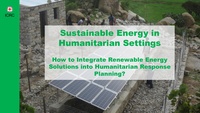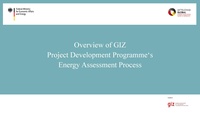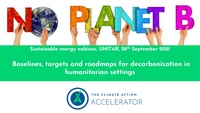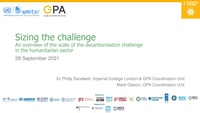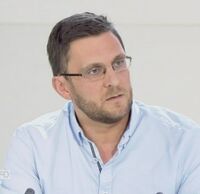Knowledge fuels change - Support energypedia!
For over 10 years, energypedia has been connecting energy experts around the world — helping them share knowledge, learn from each other, and accelerate the global energy transition.
Today, we ask for your support to keep this platform free and accessible to all.
Even a small contribution makes a big difference! If just 10–20% of our 60,000+ monthly visitors donated the equivalent of a cup of coffee — €5 — Energypedia would be fully funded for a whole year.
Is the knowledge you’ve gained through Energypedia this year worth €5 or more?
Your donation keeps the platform running, helps us create new knowledge products, and contributes directly to achieving SDG 7.
Thank you for your support, your donation, big or small, truly matters!
Difference between revisions of "Webinar Series: Sustainable Energy in Humanitarian Settings"
***** (***** | *****) m Tag: 2017 source edit |
***** (***** | *****) m Tag: 2017 source edit |
||
| Line 11: | Line 11: | ||
As part of the outreach and capacity building activities of this movement, the [https://www.icrc.org/en International Committee of the Red Cross (ICRC)] together with the Steering Group of the GPA and other partners are conducting a series of webinars on humanitarian energy issues to raise awareness and spread knowledge about different technologies, best practices and impacts. | As part of the outreach and capacity building activities of this movement, the [https://www.icrc.org/en International Committee of the Red Cross (ICRC)] together with the Steering Group of the GPA and other partners are conducting a series of webinars on humanitarian energy issues to raise awareness and spread knowledge about different technologies, best practices and impacts. | ||
</div> | </div> | ||
| + | <div id="tabs"> | ||
| + | * [[#Webinar 1|Webinar 2 - Technical Input]] | ||
| + | * [[#Webinar 2|Webinar 1: How to Integrate Renewable Energy Solutions into Humanitarian Response Planning?]] | ||
| + | <div id="Webinar 1"> | ||
| + | |||
| + | === Webinar 2 - Technical Input === | ||
| + | Tue, Oct 26, 2021 2:00 PM - 3:30 PM CEST | ||
| + | Register here: https://register.gotowebinar.com/register/6487620399167759375 | ||
| + | |||
| + | This webinar will provide hands-on guidance to support practitioners for transitioning to renewable energy sources for facilities and community services (pumping, health centers). The first presentation will provide an overview of the key steps for conducting an energy audit (eg. load assessment, system design, analysis..) along with developing a value proposition for decarbonisation. The second presentation will focus on powering healthcare using HOMER tool. This webinar is part of the three-part series, Decarbonisation of Energy Infrastructure in Displacement Situations and is organised jointly by ICRC, UNITAR and Energypedia. The webinar series aims to share knowledge and good practices as well as technical tools on how to switch to renewable powered energy solutions in humanitarian settings. | ||
| + | </div> | ||
| + | <div id="Webinar 2"> | ||
==Webinar: How to Integrate Renewable Energy Solutions into Humanitarian Response Planning?== | ==Webinar: How to Integrate Renewable Energy Solutions into Humanitarian Response Planning?== | ||
| Line 19: | Line 31: | ||
This webinar is the first of three webinars focusing on the decarbonisation of energy infrastructure in displacement situations, taking place in September, October and November 2021. The webinars will share knowledge and good practice on how to switch from fossil fuel-based energy sources to renewable ones; provide technical tools and processes to make the transition happen; and last, but not least, share lessons learnt and experience from the ground. | This webinar is the first of three webinars focusing on the decarbonisation of energy infrastructure in displacement situations, taking place in September, October and November 2021. The webinars will share knowledge and good practice on how to switch from fossil fuel-based energy sources to renewable ones; provide technical tools and processes to make the transition happen; and last, but not least, share lessons learnt and experience from the ground. | ||
| − | + | </div> | |
| + | </div> <!-- End #tabs --> | ||
== Presentations == | == Presentations == | ||
[[File:1. ICRC Presentation.pdf|200px]] | [[File:1. ICRC Presentation.pdf|200px]] | ||
Revision as of 15:04, 4 October 2021
Webinar Series Sustainable Energy in Humanitarian Settings
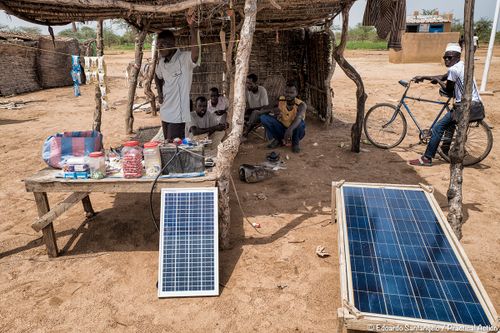
Today, over 130 million people are in need of humanitarian assistance due to conflict, natural disasters, and other complex global challenges. For many of these people, access to energy sources is critical for survival, and how they access it impacts their health, livelihoods, safety, and well-being.
Energy access for displaced people is not prioritized in the global humanitarian system. Current energy practices in situations of displacement are often inefficient, polluting, unsafe for users, and harmful to the surrounding environment. Moreover, institutional humanitarian operations such as water pumping, community lighting, and health clinics rely heavily on unsustainable fossil fuels, costing hundreds of millions of dollars annually.
Given the complex nature of humanitarian response and the challenges of integrating sustainable energy solutions into the humanitarian program cycle, there is not just one solution but a need for systemic actions to mobilise resources, build capacity and use the opportunity for sustainable energy solutions to enhance impact in sectors such as health, protection, food security, and WASH. read more
Against this background, key actors involved in displacement settings developed in 2018 the Global Plan of Action for Sustainable Energy Solutions in Situations of Displacement (GPA). It’s mission is to equip stakeholders with the capacity to mainstream sustainable energy solutions into programming, with the goal of delivering improved protection, dignity, and energy-related social, environmental, and economic benefits to displaced people.
As part of the outreach and capacity building activities of this movement, the International Committee of the Red Cross (ICRC) together with the Steering Group of the GPA and other partners are conducting a series of webinars on humanitarian energy issues to raise awareness and spread knowledge about different technologies, best practices and impacts.
- Webinar 2 - Technical Input
- Webinar 1: How to Integrate Renewable Energy Solutions into Humanitarian Response Planning?
Webinar 2 - Technical Input
Tue, Oct 26, 2021 2:00 PM - 3:30 PM CEST Register here: https://register.gotowebinar.com/register/6487620399167759375
This webinar will provide hands-on guidance to support practitioners for transitioning to renewable energy sources for facilities and community services (pumping, health centers). The first presentation will provide an overview of the key steps for conducting an energy audit (eg. load assessment, system design, analysis..) along with developing a value proposition for decarbonisation. The second presentation will focus on powering healthcare using HOMER tool. This webinar is part of the three-part series, Decarbonisation of Energy Infrastructure in Displacement Situations and is organised jointly by ICRC, UNITAR and Energypedia. The webinar series aims to share knowledge and good practices as well as technical tools on how to switch to renewable powered energy solutions in humanitarian settings.
Webinar: How to Integrate Renewable Energy Solutions into Humanitarian Response Planning?
What is the need for and challenges of switching to renewable energy infrastructure in the humanitarian context? This webinar focuses on the decarbonisation of energy infrastructure and the associated challenges and opportunities in the humanitarian sector. Experts will share their insights on the need and processes for decarbonisation of energy infrastructure in humanitarian responses, how to establish an organisational baseline and roadmap for emissions reductions, and share financial projections on what is needed to decarbonise the humanitarian sector.
This webinar is the first of three webinars focusing on the decarbonisation of energy infrastructure in displacement situations, taking place in September, October and November 2021. The webinars will share knowledge and good practice on how to switch from fossil fuel-based energy sources to renewable ones; provide technical tools and processes to make the transition happen; and last, but not least, share lessons learnt and experience from the ground.
Presentations
Speakers
Kathrine Alkjaersig VAG, International Committee of the Red Cross (ICRC): With over 10 years of experience as an expert in environmental management notably at DuPont Sustainable Solutions, the strategic consulting company in sustainable energy E4tech and the Netherlands Environmental Assessment Agency, Kathrine Vad is since 2017 the ICRC’s Environment and Climate Change Advisor. One of the ICRC’s strategic objectives for 2024 is to bolster the sustainability of its humanitarian response which is why in her role, Kathrine strives to enhance the ICRC’s own environmental responsibilities and to further environmental and climate change practices within the ICRC’s assistance programmes”.
Maryanne Maina, Humanitarian Settings Component - GIZ Project Development Programme Humanitarian Component: Maryanne is a sustainability professional with over 10 years’ experience working in the renewable energy, energy efficiency and climate finance sectors. She is currently a project manager within the GIZ Project Development Programme under the German Energy Solutions Initiative supporting the humanitarian sector with their objective of meeting net zero greenhouse gas emissions targets. She is also responsible for the project’s activities in Kenya and Ghana.
Bruno Jochum, Climate Action Accelerator: Bruno Jochum is the Director of the Climate Action Accelerator, a new non-for-profit initiative based in Geneva aiming to support aid and health organisations to halve their emissions by 2030, turn them into vectors of change and share climate solutions as an open source common good within a community of practice. Previously Director-General of Médecins sans Frontières Switzerland, a medical humanitarian organisation with 7,000 employees in 24 countries, he is the author of several articles on the humanitarian and aid dimensions of the climate crisis. He is a Global Fellow at the Geneva Centre for Security Policy and a regular contributor on climate at Geneva Solutions, an online media launched by Heidinews.
Philip Sandwell, Imperial College London: Dr Philip Sandwell is a Research Associate at Imperial College London and is currently seconded to the GPA Coordination Unit at UNITAR. His research focuses on techno-economic modelling and optimisation of solar minigrids, and the impacts and opportunities for decarbonisation in situations of displacement.
List of Past Webinars
- How to Integrate Renewable Energy Solutions into Humanitarian Response Planning? (Sept 2021)
- Landscaping : Capacity Building and Knowledge Sharing Opportunities (Feb 2021)
- Productive Uses of Energy in Humanitarian Contexts (Oct 2020)
- Powering Possibilities : Lessons Learned from Mini-grid Application in Conflict and Fragile Contexts (Sep 2020)
- Powering WASH : Renewable Energy for Water Supply in Humanitarian Settings (June 2020)
- Powering Humanitarian Health Operations : Sustainable Energy Solutions (May 2020)
- Energy Efficiency and Designing for Sustainability in Humanitarian Response (Feb 2020)
- Powering Humanitarian Facilities : Dialogue on Implementation Models (Jan 2020)
- Sustainable Energy for Household Cooking Needs in Humanitarian Settings (Dec 2019)
- Sustainable Energy for Powering Household and Community Lighting Needs in Humanitarian Settings (Nov 2019)
- Sustainable Energy for Essential Humanitarian Services : Outline of Energy Solutions and a Case Study on Solar Pumping (Sep 2019)
- State of Play : Sustainable Energy in Humanitarian Settings (June 2019)
Further Resources on Humanitarian Energy
Find here some useful resources for further information:
Available resources on energypedia
Global Plan of Action
- Global Plan of Action - Framework for Action
- Global Plan of Action - Unitar website
- Identification And Analysis Of Standard Clauses Of PPA And Leasing Agreements For Energy Provision In The Humanitarian Sector
- Feasibility and Applicability of a Global Guarantee Mechanism in Humanitarian Energy Contracts
- SAFE Workshop 2019 - Final Report
- Humanitarian Energy Conference 2019 - Final Report
- Renewable Electrification of Refugee Camps – Phase 1
Mercy Corps
Moving Energy Initiative
- The Costs of Fuelling Humanitarian Aid (2018)
- The Solar Energy Handbook - A guide to institutional solar for organizations working in humanitarian settings
- Private-Sector Engagement - The Key to Efficient, Effective Energy Access for Refugees. Toolkit (2016)
- Heat, Light and Power for Refugees Saving Lives, Reducing Costs (2015)
- Prices, Products and Priorities - Meeting Refugees’ Energy Needs in Burkina Faso and Kenya (2018)
Renewable Energy Transition
- McKinsey (2019): Energy Perspective 2019: Reference Case
- World Economic Forum (2019): Fostering Effective Energy Transition 2019
- World Economic Forum Website: Shaping the Future of Energy
Grantham Instittute
Blog Articles
- Rachel Kyte: https://www.seforall.org/news/on-world-humanitarian-day-its-time-we-finally-talk-about-energy-access
- Vijay Bhopal and Sandy Robinson: Is Sustainable Attainable?

